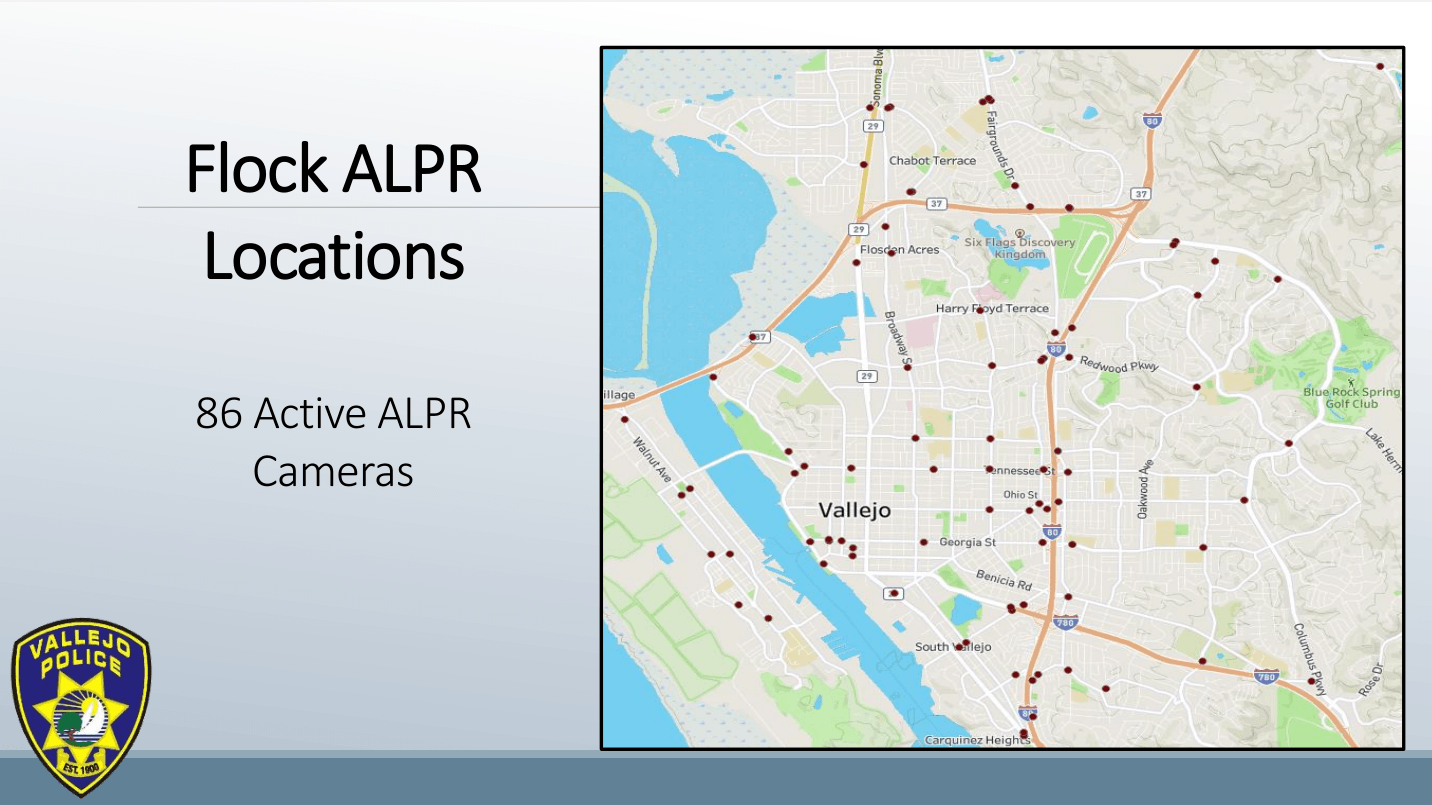VALLEJO – The Vallejo Police Department is continuing to share automated license plate reader data with the Houston Police Department and other out-of-state agencies in an apparent ongoing violation of California law, according to privacy watchdog groups and the city’s Surveillance Advisory Board.
The surveillance board discussed the continuing data sharing at its meeting Thursday as the board considered whether to support a new five-year contract with Flock Safety, the provider of the ALPR cameras.
Last year, the department removed several out of state agencies in response to a surveillance board inquiry over concerns that police departments from states with highly restrictive abortion laws could use the technology to track and prosecute people seeking reproductive health care in California.
At the time, the Electronic Frontier Foundation, a non-profit group that litigates privacy issues, argued that sharing license plate reader data with out-of-state agencies is prohibited by Senate Bill 34, a California law enacted in 2016. The EFF later published a list of 71 California police departments it said were violating the law.
Deputy Chief Drew Ramsay said during Thursday’s meeting that the department does not share with agencies outside of California. Surveillance Advisory Board member Mike Moreno pointed out that the Vallejo Police Department transparency portal lists the Houston Police Department as one of the external organizations that has access to Vallejo’s data.
“We went through and did an audit, we took out all of them,” Ramsay said. “If there's one in there from outside, I'll do another sweep of the system to make sure, but we should not be sharing outside of California.”
Oakland Privacy Director of Research Mike Katz-Lacabe, who was invited by the board to comment at the meeting, said that the violation was ongoing.
“Vallejo PD is currently sharing ALPR data with Houston, Texas PD. That is based on the Flock Safety portal, that whole process is automated, so that is happening today,” Katz-Lacabe said. “That means when Houston PD does a search for something of interest to Houston PD, which as we all know, Texas is not very friendly to reproductive rights, so if they do a search, it is going to include data from Vallejo’s cameras.”
Katz-Lacabe went on to say that the department’s Flock Safety transparency portal also lists the U.S. Marshals Service, although it is noted as inactive, and the U.S. Postal Inspection Service, which are also out of state agencies according to the state’s definition. He said that the law has been in place since 2016 but the California Department of Justice also issued guidance documents in October 2023 that specifically address this issue.
Along with SB 34, the legislature also passed the California Values Act in 2017, which prohibited data sharing for the purposes of immigration enforcement. The laws were originally designed to support the state’s sanctuary status by preventing California police departments from coordinating with Immigration and Customs Enforcement or other out of state agencies.
When the U.S. Supreme Court overturned Roe v. Wade in 2022, allowing states to enact abortion bans, new concerns arose that ALPR data could be used to track residents traveling to another state to obtain legal reproductive healthcare.
The renewal of the contract with Flock Safety would fund the city’s existing ALPR program for five years at a cost $1.49 million, which the department recommends funding through the city’s eighth-cent sales tax known as Measure P, which voters approved in 2022.

The department plans to add nine new ALPR cameras to the existing 86 active cameras located throughout the city along with 13 new Flock Safety “Condor” cameras that are designed with point tilt and zoom functions to allow officers to identify criminal activity in areas where foot traffic is common.
The department’s presentation materials stated that the ALPR cameras are a valuable investigative tool that contributed to 238 arrests and 227 stolen vehicle recoveries from June 2020 and to October 2023.
However, Katz-Lacabe pointed out that the department did not offer any comparison statistics for years prior to the use of the cameras.
“Without a comparison to what was going on before the cameras were installed I don't understand how you could claim any effectiveness whatsoever,” Katz-Lacabe said. He said that the department’s accounts of several incidents in which the ALPR cameras were used to make an arrest are valuable for consideration but “they seem to imply that the crime was not solved prior to having the ALPRs.”
Katz-Lacabe stressed that in an era of data-driven policing, it is important to compare data on false-positives or misidentified plates as well as arrest data prior to implementation in order to determine if technology is truly effective.
Surveillance board chair and mayoral candidate Andrea Sorce pointed to a specific section of the contract stating that the company may disclose license plate reader information that is stored in the system for 30 days “if legally required to do so or if Flock has a good faith belief that such access, use, preservation or disclosure is reasonably necessary to comply with a legal process.”
Sorce asked City Attorney Veronica Nebb if it would be possible for a state that prohibits abortion to subpoena information from Flock for evidence in the prosecution of a resident for seeking reproductive care in California.
Nebb said that the subpoena would have to be issued within the 30 days that Flock retains the data, which, she said, is unlikely but theoretically possible.
The board moved to recommend several additions to the Flock Safety renewal contract, including language ensuring that the city’s policy prohibits the sharing of data for the prosecution of activities relating to reproductive rights and that Flock acknowledges and agrees to not not provide data related to the city’s prohibited uses.
The board also recommended the removal of all out-of-state agencies including the Houston Police Department, the U.S. Marshals Service and the U.S. Postal Inspection Service. The board also requested that the department verify if any data had been shared with the out of state agencies that are currently allowed to access the information and to ensure that no out-of-state agencies are allowed access again.
The City Council will consider whether to approve the new Flock contract on Tuesday.
The city also has a separate contract with Flock Safety to beta test a gunshot detection system, which the City Council approved despite the surveillance board’s recommendation against it. Ramsay said that 80% of detectors are installed and the department plans to start using the system at 90%, which they should reach in the coming weeks because the company plans to have installation complete in August.
Sorce said that a number of residents have been frustrated with the roll-out because Flock workers in unmarked trucks installed poles with detection devices in private yards without any notice.
Residents on the social media application Nextdoor complained that the workers installed poles in positions that made it difficult to access parking or in spots that interfered with their landscaping. Some commenters said that because of the lack of notice and unmarked trucks they were concerned that the devices could be used to monitor resident activity for burglary opportunities or other malicious intent.
Source said that some of the locations may involve a public facilities easement but that communication about the installations was lacking and residents were rightfully alarmed that poles with surveillance devices showed up in their yards.
Once the system is active, the beta testing period for the gunshot detectors will proceed for a year at which point the city will decide whether to continue with the use of the technology by negotiating a longer term contract.
Before you go...
It’s expensive to produce the kind of high-quality journalism we do at the Vallejo Sun. And we rely on reader support so we can keep publishing.
If you enjoy our regular beat reporting, in-depth investigations, and deep-dive podcast episodes, chip in so we can keep doing this work and bringing you the journalism you rely on.
Click here to become a sustaining member of our newsroom.
THE VALLEJO SUN NEWSLETTER
Investigative reporting, regular updates, events and more
- policing
- surveillance
- government
- privacy
- Vallejo
- Vallejo Police Department
- Vallejo Surveillance Advisory Board
- Flock
- ALPR
- Electronic Frontier Foundation
- SB 34
- Mike Moreno
- Drew Ramsay
- Mike Katz-Lacabe
- Oakland Privacy
- California Values Act
- Andrea Sorce
- Veronica Nebb

Ryan Geller
Ryan Geller writes about transitions in food, health, housing, environment, and agriculture. He covers City Hall for the Vallejo Sun.
follow me :




